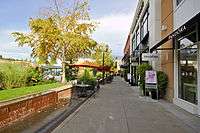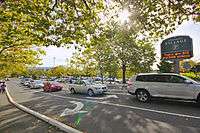University Village, Seattle
 | |
| Location | Seattle, Washington, USA |
|---|---|
| Website | Official Website |
University Village (colloquially known as U-Village or U-Vill) is an upscale shopping mall in Seattle, Washington, built at the south corner of Ravenna neighborhood.[1] Located north of Downtown Seattle, University Village is an open-air lifestyle shopping center which offers restaurants, locally-owned boutiques, and signature national retailers. U-Village is a regional destination for home furnishings, popular fashions and unique gift items with a distinct collection of restaurants and eateries.
History
Creation
University Village was originally developed by Continental Inc. who also developed Westwood Village in West Seattle and Aurora Village in Shoreline, Washington.
The 24 acre (97,000 m²) shopping center was built in 1956 across NE 45th Street on an earlier part of the Montlake Landfill (since 1911, 1922–1966), taking out what remained of the Union Bay Marsh that was drained by the lowering of Lake Washington as a result of the opening of the Lake Washington Ship Canal (1913–1916).[2] Some wetland was later partially restored as the Union Bay Natural Area with the Center for Urban Horticulture.[3]
Early history
Until the early 1990s, the character of University Village was decidedly different. Most of its businesses were small, and the chain stores were all local: Ernst Hardware and Malmo Nursery, Lamonts department store (acquired by Gottschalks in 2000), Pay 'n Save Drugs (sold to PayLess Drug in the early 1990s), and QFC supermarket. There was even a bowling alley, Village Lanes. Many of the businesses began to falter toward the end of the 1980s, however, and in 1993 the owners of the mall decided to sell. For much of this period, University Village was owned by the Tektronix Retirement Investment Fund.
Modern
The chairman of QFC and a partner bought it, and tenants such as those mentioned above began to move out. U-Village no longer has a hardware store, but features upscale national stores such as Restoration Hardware, Pottery Barn, Miller-Pollard, Banana Republic, and Crate & Barrel instead (as well as related local specialty stores). Despite this, 61% of U-Village merchants are still local. (The Ernst and Pay n' Save corporate chains went out of business in the 1990s; adjacent QFC still nominally exists, but as a division of Kroger.)
Shops



Anchor tenants today are local and family-owned Bartell Drugs (since 1890), Apple Store,[4] Crate & Barrel, The Gap, and Pottery Barn.[5] Significant adjacent anchors are the Seattle QFC flagship store, a large Safeway, and an Office Depot. In 1991, neighborhood activists initiated a campaign with the City to "daylight" Ravenna Creek through Ravenna Park to Lake Washington, but the segment from the park to the University of Washington (UW) and the Union Bay Natural Area was successfully blocked by the owners of University Village. It has been recently updated to include more shops below the brand new medical center. [6]
Amazon.com, an online retailer founded and based in the region, opened its first physical storefront at University Village on November 3, 2015.[7]
Boundaries
The campus of the UW is to the west and south, the neighborhood of Bryant farther to the east, and the neighborhood of Ravenna to the north,[8] but portions of the surrounding neighborhoods are often referred to as being in "University Village" themselves, approximately west to 22nd Avenue NE, north to NE 55th Street, and east to Union Bay Place NE and 30th Avenue NE. The area's principal arterials are 25th Avenue NE and NE 45th Street; 35th Avenue is a minor arterial. Collector arterials are NE Blakeley-Union Bay Place NE and NE 55th streets.[9]
Competing local shopping
- Northgate Mall
- The Ave
- Downtown Lake City
See also
References
- ↑ (1)
Seattle City Clerk's Neighborhood Map Atlas (n.d., map .jpg c. June 17, 2002). ""Ravenna", map". Office of the Seattle City Clerk. Retrieved April 21, 2006. Check date values in:
|date=(help) Maps "NN-1030S", "NN-1040S".jpg dated June 17, 2002.
Note caveat in footer.
(2) ""About the Seattle City Clerk's On-line Information Services", Information Services, Seattle City Clerk's Office". Office of the Seattle City Clerk. n.d. Retrieved April 21, 2006. See heading, "Note about limitations of these data". - ↑ (1) Dorpat
(2) Phelps, pp. 59, 68. 207–208.
(3) Stein - ↑ Center for Urban Horticulture
- ↑ Warren
- ↑ Largest by square footage, alphabetically. Next largest are Anthropologie, Banana Republic, Fiorini Sports, Smith & Hawken, and Storables, alphabetically. 206 stores plus five offices.
"University Village Map" (PDF). University Village. May 7, 2006. Archived from the original (PDF) on May 20, 2006. Retrieved May 21, 2006. - ↑ (1)
"Chronology". Ravenna Creek Alliance. n.d., August 1998 per Chronology. Retrieved April 21, 2006. Check date values in:
|date=(help)
(2) Ravenna Creek Alliance (November 9, 2005). "Ravenna Creek Alliance: Specific Info". EarthLink. Retrieved April 21, 2006.
(3) O'Neil - ↑ Greene, Jay (November 2, 2015). "Amazon opening its first real bookstore — at U-Village". The Seattle Times. Retrieved November 9, 2015.
- ↑ Seattle City Clerk's Neighborhood Map Atlas (n.d., map .jpg c. June 17, 2002). ""Ravenna", map". Office of the Seattle City Clerk. Retrieved April 21, 2006. Check date values in:
|date=(help) - ↑ Seattle City Clerk's Neighborhood Map Atlas (January 12, 2004). "Low-Resolution Version" (PDF). Street Classification Maps. Seattle Department of Transportation. Retrieved April 21, 2006. For browser use; other versions for printing, cf. Bibliography. From "Principal, Minor and Collector arterials", Seattle Department of Transportation, 2005.
External links
| Wikimedia Commons has media related to University Village, Seattle, Washington. |
Bibliography
- "About Gottschalks". Gottschalks. n.d. Retrieved June 21, 2006.
- "About the Seattle City Clerk's On-line Information Services", Information Services, Seattle City Clerk's Office. Retrieved April 21, 2006. See heading, "Note about limitations of these data".
- "Chronology". Ravenna Creek Alliance. n.d., August 1998 per Chronology. Retrieved April 21, 2006. Check date values in:
|date=(help) - Dorpat, Paul (June 18, 2001, updated May 2002). "Seattle Neighborhoods: University District -- Thumbnail History". Retrieved April 21, 2006. HistoryLink page updated from Paul Dorpat, Seattle: Now and Then Vols. 1, 2, and 3. Seattle: Tartu Publications, 1984, 1988);
Walt Crowley and Paul Dorpat, "The Ave: Streetcars to Street Fairs", typescript dated 1995 in possession of Walt Crowley and Paul Dorpat, Seattle, Washington;
Walt Crowley, Rites of Passage. Seattle: University of Washington Press, 1995;
Cal McCune, From Romance to Riot: A Seattle Memoir. Seattle: Cal McCune, 1996;
Roy Nielsen, UniverCity: The City Within City: The Story of the University District Seattle: University Lions Foundation, ca. 1986;
Clark Humphrey, Loser: the Real Seattle Music Story. Portland, OR: Feral House, 1995. - "HISTORY @ UBNA" (Union Bay Natural Area). Center for Urban Horticulture (n.d., 1999 per "Montlake Landfill Information Summary, January 1999" on page). Retrieved April 21, 2006.
- "Map", Home > Information > Map at "Map", U Village. PDF dated May 7, 2006. Retrieved April 21, 2006.
- O'Neil, Kit, University Community Urban Center (n.d., 1997 per Chronology). "Ravenna Creek Daylighting Project". Retrieved April 21, 2006].
- Phelps, Myra L. (1978). Public works in Seattle. Seattle: Seattle Engineering Department. ISBN 0-9601928-1-6.
- Ravenna Creek Alliance (November 9, 2005). "Ravenna Creek Alliance: Specific Info". Retrieved April 21, 2006.
- Ravenna Creek Alliance (November 9, 2005). "What's New". Retrieved April 21, 2006.
- Seattle City Clerk's Neighborhood Map Atlas (n.d., map .jpg c. June 17, 2002). "Ravenna". Retrieved April 21, 2006.
Maps "NN-1030S", "NN-1040S".jpg dated June 17, 2002. - Stein, Alan J. "Patches, Julius Pierpont", HistoryLink. March 2, 2003, retrieved April 21, 2006. Stein referenced Jack Broom, “The J.P. Generation," Pacific Magazine, The Seattle Times, April 4, 1993, pp. 6–11,14-17;
Bill Cartmel, “Hi Ya, Patches Pals," Seattle Post-Intelligencer, 11April 1971, pp. 6–7;
Erik Lacitis, “Patches Understands – and Survives," The Seattle Times, February 23, 1978, p. A15;
[no title], The East Side Journal, May 31, 1962, p. 3; Ibid. May 14, 1969, p. 19. - "Street Classification Maps". Seattle Department of Transportation. 2005. Retrieved April 21, 2006.
High-Resolution Version, PDF format, 16.1 MB
Medium-Resolution Version, PDF format, 1.45 MB January 12, 2004.
Low-Resolution Version, PDF format, 825 KB January 12, 2004.
"Planned Arterials Map Legend Definitions", PDF format. January 12, 2004.
The high resolution version is good for printing, 11 x 17. The low and medium resolution versions are good for quicker online viewing. [Source: "Street Classification Maps, Note on Accessing These PDF Files"] - Warren, James R. (updated September 13, 2004). "Bartell, George H. Sr. (1868-1956)". September 16, 1999, corrected on April 17, 2002, and updated on September 13, 2004. Retrieved April 21, 2006. Warren referenced "A Century of Business," Puget Sound Business Journal, September 17, 1999;
Junior Achievement of Greater Puget Sound Hall of Fame Series;
"Bartell Drugs: All in the Family," Seattle Post-Intelligencer, February 22, 2000, p. C-1;
Bartell Drugs Webpage (http://www.bartelldrugs.com).
"For information on the origin of the soda fountain see the "About Inventors" Website (http://inventors.about.com)."
Coordinates: 47°39′48″N 122°17′56″W / 47.6632°N 122.2989°W